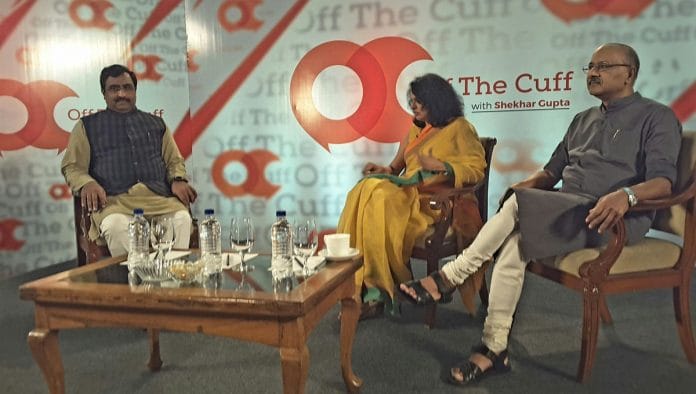The BJP’s pointsman for Kashmir made it clear that the Modi government is different and will not talk for the sake of talks
ThePrint Team
Mumbai: Underlining the government’s tough stance against militancy in Jammu & Kashmir, BJP national general secretary Ram Madhav said the government would “neutralise” every single militant in the valley and that it does not distinguish between an “Indian militant and a foreign militant”.
Madhav was speaking at the ‘Off The Cuff’ event with ThePrint Editor-In-Chief Shekhar Gupta and Editor, Opinion & Social Media, Rama Lakshmi. The event saw a packed hall on a Sunday afternoon with an enthusiastic audience which included prominent businessmen, bankers, Bollywood biggies, authors and professors.
“There are militants and armed activists. You don’t treat them in the same manner. With militants, we will act very tough, we will neutralise the last militant. But the misguided people, we will deal with differently,” Madhav said. He also stressed that there was no qualification for a militant and anybody wielding weapons and killing people is a militant, Indian or not.
“We are a different government, we won’t talk to someone holding a weapon, dictating terms in Kashmir, holding gun against the system,” he said.
“Insaniyat, jamhooriyat, Kashmiriyat is for all, the last man in Kashmir, not just for government and forces. But not for militants,” Madhav added.
He, however, did clarify that while the option for President’s Rule in Jammu and Kashmir was there, it wasn’t needed just yet. “Why are we seeing Kashmir from the prism of TV studios? That’s not real Kashmir. I am not saying everything is fine and we are tackling it,” he said.
Speaking about the rising incidents of looting of banks in the Valley, Madhav said the government has made sure that many do not store too much cash. The youth are also attacking the banks to capture the rifles of the security guards, he added.
Madhav, an expert on China, said the government was reluctant to engage with China on OBOR because of sovereignty issues.
“We refuse to engage with China on OBOR because we believe PoK is an integral part of India which isn’t in our control,” Madhav said.
“India-China relationship has had ups and downs. We have differences on OBOR but I don’t see ties deteriorating,” he added.
The senior BJP leader also said there was a need to revisit both Article 370 of the Constitution and Section 377 of the Indian Penal Code. On the latter, he said there was a need to look into the criminality aspect of it.
Holding forth on domestic politics, Madhav said under the leadership of Prime Minister Narendra Modi, we are “moving towards a presidential system or style of governance”. He, however, said a country as diverse as India did need a parliamentary system. Madhav also struck a note of caution about the concept of ‘benign dictatorship’ and said it was an oxymoron. India needs “benign leadership”, he said, not dictatorship.
Madhav, who has been a key architect of the BJP’s expansion into the North-East, said it was politically important for the BJP to do so given it did not have a presence beyond Assam.
But, he said, the North-East is also the gateway to India’s strategic projection in the South-East Asian region. “North-East should be treated as the land pivot of the government’s Act East policy. That’s my advice to our government,” he said.
Madhav, who is a product of the RSS, also dwelled upon the relationship between the Sangh and the current dispensation, and how this equation was different under the previous NDA government led by PM Atal Bihari Vajpayee. “There were differences between RSS and BJP under Vajpayee. We sit across the table more now. We are careful to avoid attention on fault lines if any,” he said.
Talking about the concept of Hinduism versus Hindutva, Madhav said the two were not different and that every individual in the parivar accepts it and should accept it.







